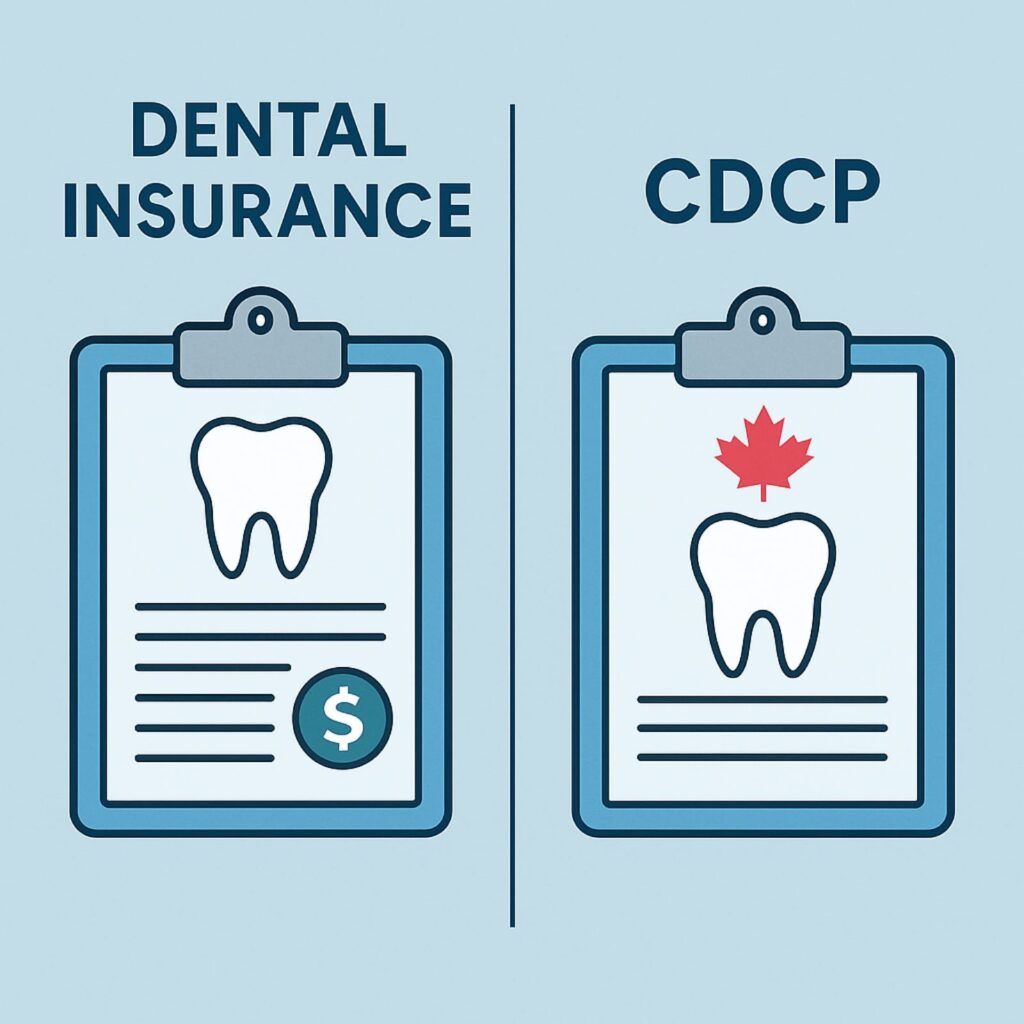Navigating dental coverage in Canada can feel confusing—especially with the introduction of the Canadian Dental Care Plan (CDCP). Many Canadians are now wondering how CDCP compares to traditional dental insurance, and which option is best for their situation.
In this article, we’ll break down the key differences between private dental insurance and the CDCP, how eligibility works, what’s covered, and how to choose the right path for your oral health care needs.

What Is the Canadian Dental Care Plan (CDCP)?
The Canadian Dental Care Plan (CDCP) is a government-funded program designed to make dental care more accessible for low- to moderate-income Canadians. Managed by Sun Life on behalf of the Government of Canada, the plan aims to reduce out-of-pocket costs for essential dental services for eligible individuals.
To qualify, you must:
- Have a family net income of less than $90,000/year
- Not have access to private dental insurance
- Be a Canadian resident and have filed a recent tax return
You can check your eligibility and apply through Canada.ca.
What Is Private Dental Insurance?
Private dental insurance is typically purchased through your employer, a group benefits plan, or directly from an insurance company. It provides coverage for a variety of dental services and often includes:
- Routine exams and cleanings
- Fillings, root canals, and extractions
- Orthodontics (braces and Invisalign)
- Cosmetic dentistry (sometimes)
- Dentures and major restorative work
Plans vary in terms of coverage amounts, annual maximums, and co-payments. Monthly premiums also differ depending on your provider and level of coverage.
CDCP vs. Private Dental Insurance: A Side-by-Side Comparison
| Feature | CDCP |
|---|---|
| Eligibility | Income-based, must not have private insurance |
| Cost | No monthly premium; may involve co-payments depending on income |
| Provider Network | Must use CDCP-participating dentists |
| Coverage Scope | Basic services: exams, cleanings, fillings, extractions, dentures |
| Management | Government (via Sun Life) |
| Feature | Private Dental Insurance |
|---|---|
| Eligibility | Available to anyone, often via employer |
| Cost | Monthly premiums and out-of-pocket costs |
| Provider Network | Broader network, but may have preferred providers |
| Coverage Scope | Broader range including orthodontics and cosmetic procedures |
| Management | Private insurance companies |
Can You Have Both?
No. If you have access to private dental insurance—even if you choose not to use it—you are not eligible for CDCP. However, if your employer does not offer a dental plan and you do not purchase one privately, you may qualify for CDCP based on your income and tax status.
Which Option Is Best?
It depends on your circumstances.
- If you’re self-employed, retired, or between jobs and meet the income criteria, the CDCP offers valuable support at no monthly cost.
- If you require orthodontics, implants, or other specialized care, private insurance may offer broader coverage (though with higher costs).
- Families may want to compare whether Healthy Smiles Ontario or group insurance offers better support depending on children’s needs.
For many Canadians, CDCP fills an important gap, especially as dental care was not historically part of universal health coverage.
Need Help Finding a CDCP Provider?
Smile Directory makes it easy to find CDCP-participating dental professionals across Canada. You can also search for dentists, denturists, hygienists, and orthodontists offering care that matches your insurance or coverage needs.